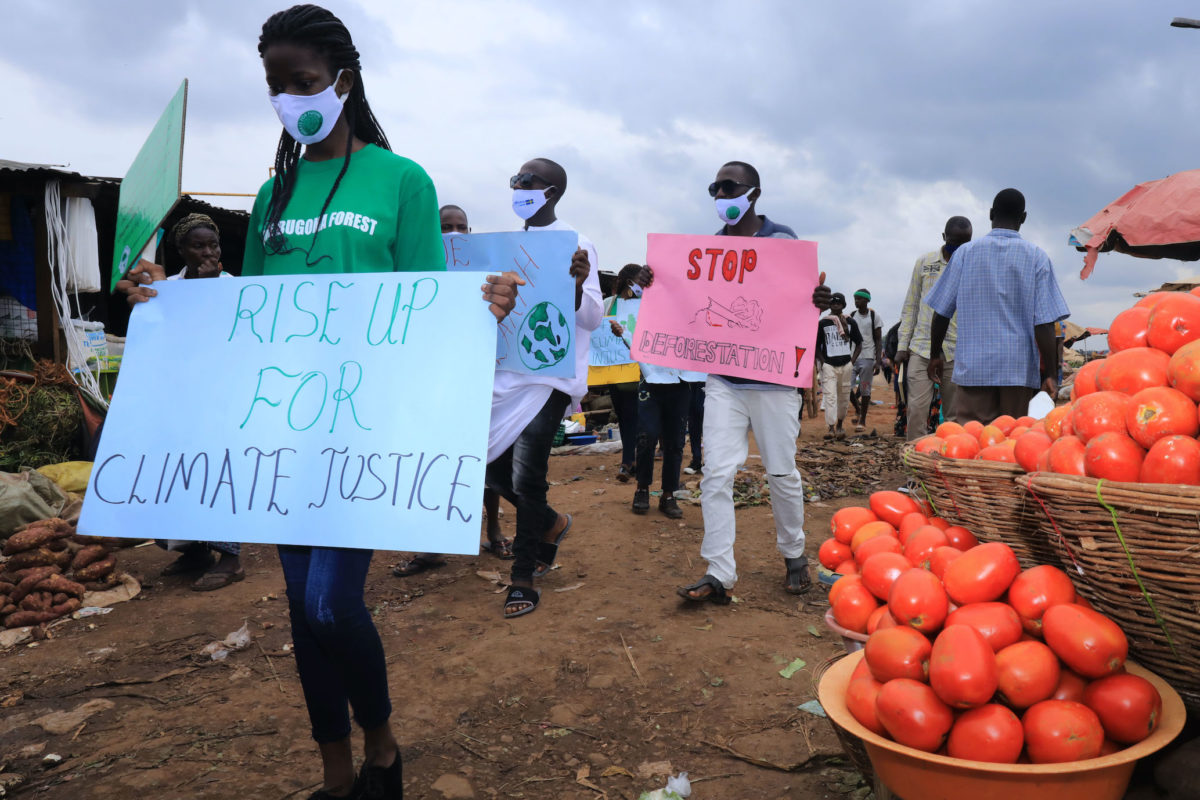Over 20 young Ugandan climate change activists were arrested while demanding their government take action on climate change, which they said is harming the country’s rainfed agricultural sector.
The activists, who were participating in a global climate strike last week, were stopped in their tracks by police for ostensibly failing to secure permission to hold their protest. Their placards were confiscated, and they were later subjected to interrogation sessions that lasted close to two hours.
“Uganda and other countries in East Africa are highly susceptible to the harsh effects of climate change and it has shown forth in hazard-related disasters such as rainfall deficits, floods, erosions, landslides, droughts, etc.,” said activist Leah Namugerwa. “In the last few years, the rains have been inconsistent, yet 85 percent of Uganda’s population and others around the region depend on rain-fed agriculture.”
Uganda is currently in a political tinder box of sorts, as the ruling party and opposition politicians preparing for next year’s parliamentary and presidential elections measure swords. The net effect has been frequent clampdowns of any form of protests, as the activists found out.
The Ugandan climate strike, which was inspired by Swedish activist Greta Thunberg, took place in the boisterous Kampala suburb of Ggaba, where the village of Katoogo was submerged by flood waters from Lake Victoria, Africa’s largest lake. The village was home to some 6,000 people.
Some of Uganda’s leading environmentalists said the flooding was caused by the extreme effects of climate change.
While the protestors carried placards bearing different climate change-related messages, the climate campaigners made it clear that they were taking up the cudgel to preserve the endangered 900-hectare Bugoma Forest Reserve in Western Uganda. The forest is a sanctuary for 600 chimpanzees and two endangered bird species: the Nahan’s francolin and the African grey parrot.
But some 9.24 square miles of the forest were recently cleared for a sugar plantation after a Ugandan high court ruled that swathes of it could be emptied for the planting to begin.
Though Ugandan ecologists and other activists had urged the government to save the forest, the country’s own National Environment Management Authority was implicated in the forest land giveaway. Others petitioned Uganda’s Parliament to intervention in the matter. The ecologists later started a social media campaign, which is still trending, called “Save Bugoma Forest.”
Bugoma, which lies within Uganda’s Lake Albert oil region, faces other risks as the forest is expected to provide a sink for waste gases generated during oil drilling.
However, the forest also has a key role as a rainmaker, supporting thousands of farmers who depend on rain-fed agriculture. Bugoma, like other forests, has also played an important role in the area’s watershed health by intercepting rainfall with its thick canopy.

“Bugoma Forest Reserve should not be desecrated,” said Hilda Flava Nakabuye, who organized the protest in collaboration with Namugerwa and Sadrack Nirere, all of them climate and environmental rights activists.
“We are demanding climate justice from the Ugandan government,” Nakabuye said. “We also demand climate justice from all global leaders because here in Africa, we bear the brunt of harmful emissions, yet our continent is the least emitter of greenhouse gases in the atmosphere. Africa accounts for the smallest share of emissions, which is 3.8 percent. We demand that our leaders take urgent action to tackle this crisis because its harsh impacts, for instance on our agricultural sector, are already worrying.”
According to the Intergovernmental Panel on Climate Change [2007], agricultural productivity in sub-Saharan Africa will decline significantly by 2080 due to climate change. Since agriculture in sub-Saharan Africa is mostly rain-fed, the report suggests that rising temperatures will likely reduce the production of stable foods by up to 50 percent.
Namugerwa, a young environmental activist renowned for leading a sustained campaign prevailing upon Uganda’s rulers powers to ban plastic bags, said the strike was organized as a call to action on the climate change crisis that Africa faces.
“There is a need for action to tackle the crisis in earnest,” Namugerwa said. “If our government and others around the region keep dragging their feet on this issue, the upshot will likely be very adverse for their nations.”
The activists, who reportedly were made to record statements, were later freed on police bond and ordered to report back to the police precinct for further proceedings.
As in 2019, thousands of Africans joined several million climate protesters in the global Climate Strike. There were protests in Tanzania, Sierra Leone, South Africa, Senegal and Kenya, among other places.
Images by Richard Wetaya.
